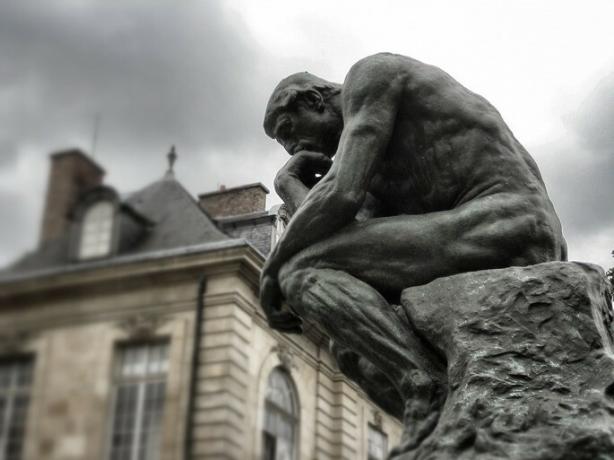The myth emerged as narratives of ancient Greek people to explain phenomena of nature that they could not understand. It was and is generally used to explain the origin of events.
Philosophy is the study and reflection of questions related to human existence. It also reflects on knowledge, moral and aesthetic values, thought and language.
Unlike myth, which has its explanations based on belief, philosophy is methodical knowledge based on reason and logic.
| Myth | Philosophy | |
|---|---|---|
| Function | Explanation and reading of reality | Explanation and reading of reality |
| Foundation of knowledge | Belief | Reason |
| Elements for the construction of knowledge | images and symbols | Logical reasoning |
What is myth?
The concept of myth is based on the idea that the ancient Greeks created narratives to explain events and phenomena of nature that they could not understand.
It is also important to mention that a myth, in most cases, can have a foundation of truth, based on a real event or on the relationships of individuals with the world.
By not having logic as a foundation, myths assume a fantastic character (fantasy).
However, a myth does not mean a “fairy tale”. This is because it carries within itself the explanation for phenomena related to human existence.
Myths sought to make sense of things at a time when there was no other way to explain them. Therefore, a myth is more than a fictional narrative.
In traditional civilizations that have a mythical consciousness, there is not the same relationship and division between what is natural and supernatural today. Both conceptions are engendered in explanations and in the reading of the world.
It is common for the word "myth" to be used as a synonym for legend, but in general a myth can also refer to historical events. This is if they are full of symbolism and importance for a certain group of people.
examples of myths
The most famous myths arose in Greek antiquity. At that time, the gods were used to represent various aspects of life and the planet. As an example, let's cite two Greek myths:
Pandora's Box

In the story, the character Pandora had won a box from the father of the gods, which she was forbidden to open.
Moved by her curiosity, Pandora opens the box and ends up releasing all the evils in the world: diseases, wars, old age, hatred, jealousy, among others. Immediately repentant, Pandora closes the box, but it was too late.
The only thing left at the bottom of the box was something small: hope.
The moral of the story: despite all the evils, having hope always kept in your heart, no matter how small, is a sign that everything can be different. After all, something can be done for those corrupted by out-of-the-box terrors.
The 12 Labors of Hercules

The son of Zeus with a mortal woman triggered an unhealthy jealousy in Hera, the wife of the god of gods. Therefore, Hera, the goddess of marriages, motherhood and wives, began to persecute the demigod fiercely.
In one of the episodes in which Hercules loses his mind because of Hera, the hero ends up killing his own wife and children. To redeem himself from this terrible deed, Hercules is then tasked with performing 12 labors. They were:
- Kill the biggest lion in the world, the Nemean Lion;
- Slay the monstrous Hydra of Lerna;
- Capture the Doe of Cerineia;
- Capture the Erymanthian Boar alive;
- Clean the pens of the Augean King in one day;
- Kill and expel monsters from Lake Stymphalos;
- Bring the Cretan Bull alive to King Eurystheus;
- Punish Diomedes, the King of Thrace;
- Defeat the Amazons and wear Queen Hippolyta's belt;
- Kill the giant Geryon monster;
- Gather the golden apples of the Garden of the Hesperides;
- Bring to Earth the guardian of the world of the dead, Cerberus.
Because it is a myth thousands of years old, the order of Hercules' labors may appear different, depending on the author.
However, all works came to be seen as a hero's spiritual journey. The metaphors and allegories used in the myth served for reflection. This is because Hercules, repentant of one of the greatest atrocities he could commit, faced death several times in search of redemption.
These are examples of myths that are still told around the world today. However, there are several recent myths, since they can arise based on historical events or that carry enough symbolism to gain the form of a myth.
What is philosophy?
From myth to philosophical knowledge it was a long way. The word philosophy comes from the Greek philosophy, which means “love of wisdom” in literal translation. It is a branch of study that seeks to understand fundamental aspects of human existence.
Philosophy also rationally reflects on knowledge, moral and aesthetic values, the human mind, truth, language, and the universe as a whole.
origin of philosophy
Around the 6th century BC, Greece was a place where many cultures met. Therefore, he received influences from different parts of the world.
Thus, from the relativization of beliefs, many individuals began to reflect on the world and its conditions in a critical way. This meant not resorting to beliefs related to Greek mythology, with the command of the gods over men based on their wills.
The term, philosophy (philo + sophia = love of wisdom), is traditionally credited to Pythagoras. He coined the expression stating that full wisdom was only for the gods, it was for human beings to love knowledge.
Men, then, could appreciate wisdom through philosophy. Pythagoras was the first person in the world to declare himself a philosopher.

study of philosophy
By having a rational approach to the subjects it debates, it is different from fields such as mythology and religion. However, philosophy is questioned by the scientific community for not using empirical methods. That is, it is not derived from concrete data from an experience, but from sensory arguments.
However, philosophy is extremely important for the development of methods used in theories, educational projects and even in scientific institutions. This is because it questions and rationally analyzes human knowledge.
As it is present in practically all areas of knowledge, and even in knowledge itself, the study of philosophy is divided into several segments. Among them, stand out:
- Metaphysics;
- The logic;
- Ethics;
- The politics;
- The aesthetics;
- The theory of knowledge;
- The philosophy of mind;
- The philosophy of the natural and social sciences;
- Phenomenology;
- The philosophy of language;
- The philosophy of physics;
- The philosophy of mathematics;
- The philosophy of religion.
Therefore, philosophy is a branch that seeks to rationally understand various aspects of human existence, and even human existence itself.
Although not necessarily relying on an empirical methodology, it is crucial for the development of knowledge theories and methodologies.
See also the differences between:
- myth and legend
- ethic and moral
- Cultural material and immaterial
- Popular and scholarly culture

